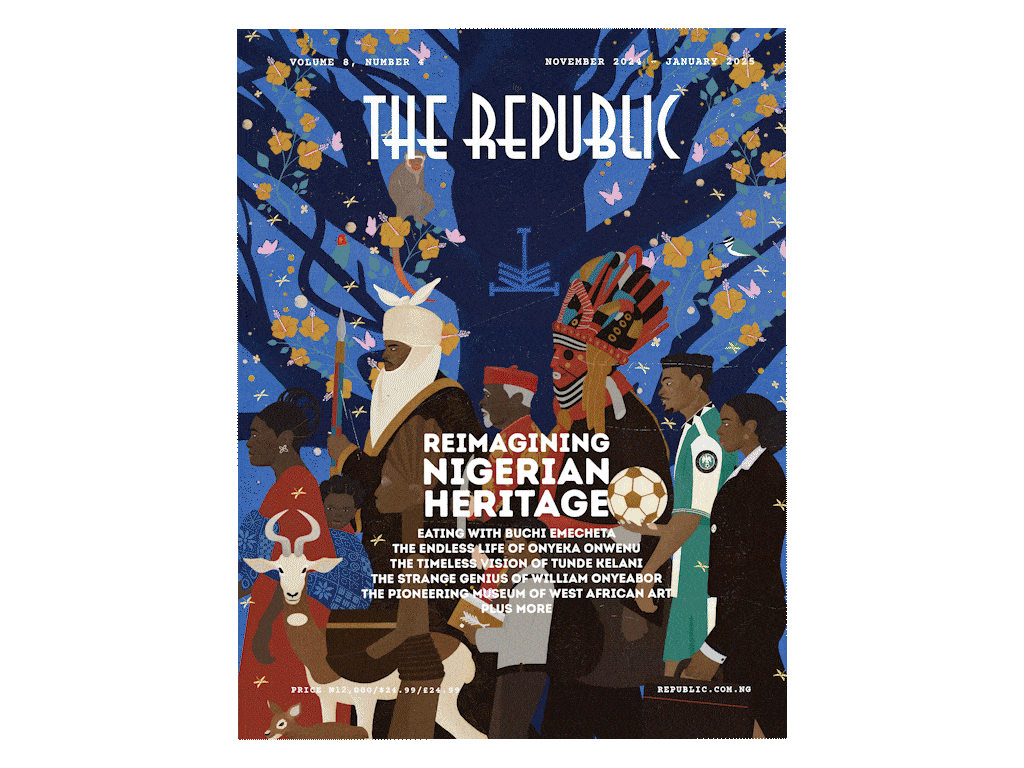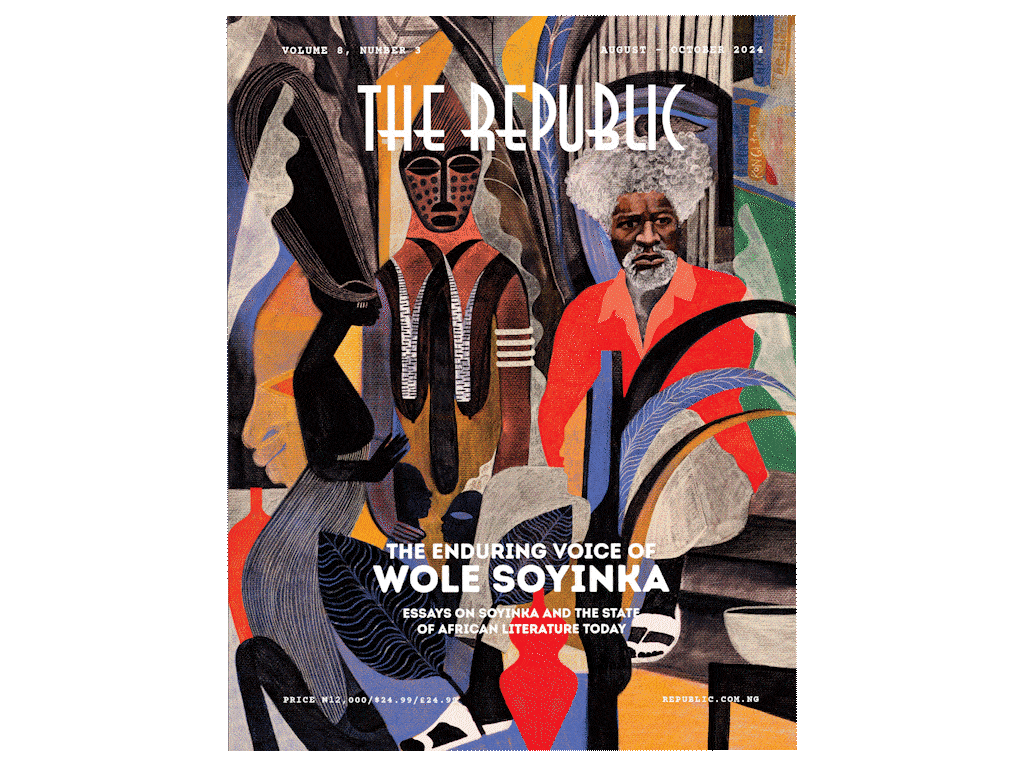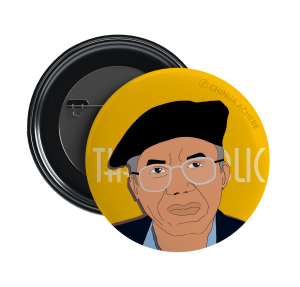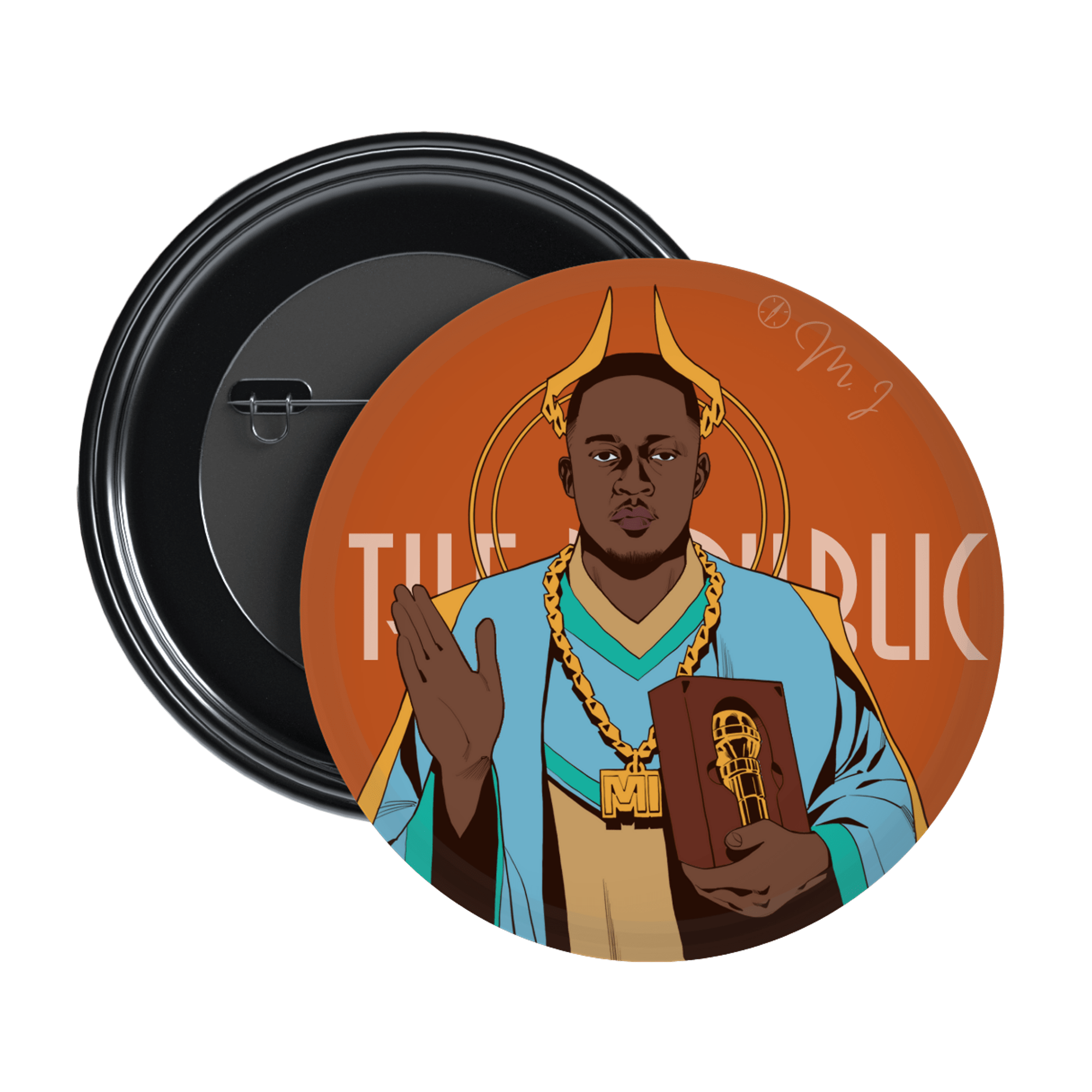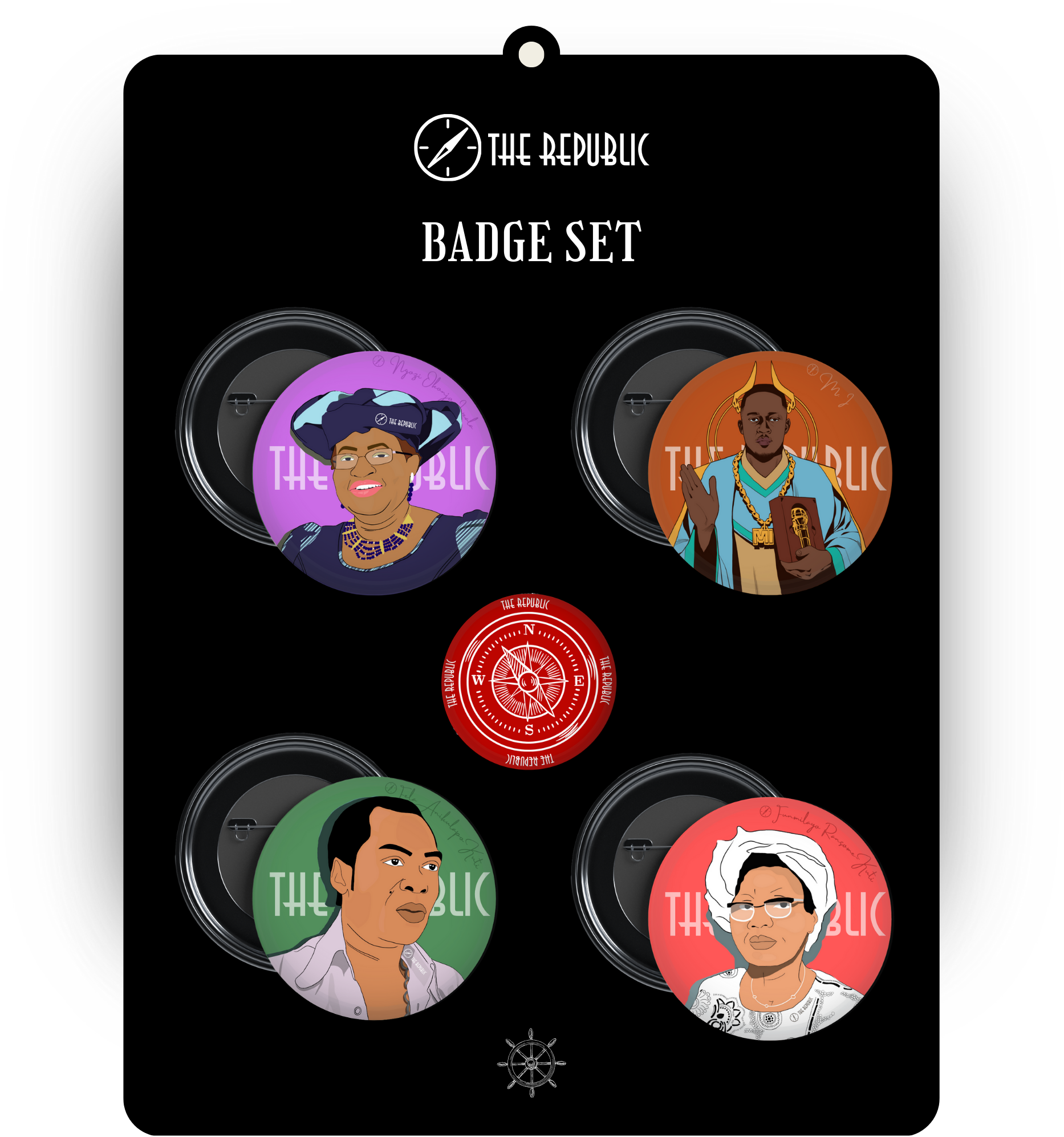
Photo Illustration by Ezinne Osueke / THE REPUBLIC. Source Ref: Photography by Ken Ota.
THE MINISTRY OF WORLD AFFAIRS / THE REPUBLIC INTERVIEWS
Exploring Global Mobility with Alma Asinobi

Photo Illustration by Ezinne Osueke / THE REPUBLIC. Source Ref: Photography by Ken Ota.
THE MINISTRY OF WORLD AFFAIRS / THE REPUBLIC INTERVIEWS
Exploring Global Mobility with Alma Asinobi
It’s the end of summer in Antarctica on 20 March 2025 and Alma Asinobi—Nigerian travel and lifestyle content creator and founder of travel brand Kaijego—stands on the cusp of an extraordinary challenge. A mix of excitement and anxiety fuels her as she embarks on an ambitious quest: to break the Guinness World Record (GWR) for the fastest journey across all continents.
The current record of 66 hours had only just been set by Johnny Cruz Buckingham of the United States on 23 February 2025—less than a month before her planned attempt. This unexpected development threw a spanner in the works, as she had initially been aiming to beat the previous record of 73 hours set by Sujoy Kumar Mitra and Dr. Ali Irani of India on 7 December 2022. Now, from the southernmost continent, she was racing against a new benchmark of 60 hours.
Record-breaking feats have become something of a cultural moment in Nigeria, arguably spurred by Hilda Baci’s cook-a-thon, breaking the record of the longest cooking marathon in May 2023. With successes from Clara Chizoba Kronburg’s longest interview to Tonye Solomon’s record for most steps climbed on a ladder while balancing a ball on the head and other attempts yet to be recognized, including several longest cooking attempts and a longest washing attempt. However, Asinobi’s attempt was about far more than breaking a record. It was a statement on mobility, passport privilege, and resilience.
For many Nigerians, international travel is both a luxury and a struggle. Nigerians pay significantly higher airfares than travellers from other parts of the world even their own neighbours, with a BusinessDay 2023 report revealing that Nigerians paid 350 per cent more than neighbouring Cameroonians for a flight to London. These costs are driven up by international carriers compensating for trapped funds as a result of Nigeria’s foreign exchange crisis. Airlines set high ticket prices to account for the inflationary losses their earnings accrue while awaiting conversion from naira to dollars for repatriation. According to the International Air Transport Association, the federal government cleared 98 per cent of these trapped funds in June 2024, reducing the backlog from a peak of $850 million in 2023 to $19 million. Yet, airfares remain high. Asinobi noted that despite travelling across all seven continents and even purchasing last-minute tickets just before departure, her two most expensive flights were to and from Nigeria.
Ranked 91st out of 199 passports on the Henley Passport Index, the Nigerian passport grants visa- free or visa-on-arrival access to just 45 out of 227 destinations, leaving most countries behind bureaucratic walls. The visa application process is often gruelling: steep fees, excessive financial requirements, and frequent rejections without explanation. Nigerian travellers also face deep-rooted suspicion, constantly having to prove the legitimacy of their intentions at every stage of travel. This scrutiny lingers from the moment a trip is conceived to the visa application process and does not ease until baggage is collected and they are safely past immigration in the destination country. Travel, for many, becomes something to be done discreetly, as though too much visibility might attract additional obstacles.
Yet, these barriers are not uniquely Nigerian. They reflect a broader struggle faced by holders of low mobility passports. The ability to move across the globe brings with it the opportunity to experience new cultures and broaden perspectives. Sadly, this freedom is unequally distributed across the globe.
Asinobi understood this reality all too well. For her, this journey was never just about breaking a record, it was about defying limitations. In her official press release she stated:
This attempt is about more than just breaking a record—it’s about showing what’s possible for young African women and anyone with a low-mobility passport. I’m determined to complete this journey in under 70 hours, proving that determination can overcome barriers in global travel. I don’t want my dreams or adventures to be determined by the colour of my skin or the country of my passport.
She set off on a route spanning Antarctica, South America, North America, Europe, Africa, Asia, and Oceania. As every traveller knows, things don’t always go according to plan. Delays, missed flights, and logistical setbacks tested her resolve. For Asinobi, there was an added layer of difficulty: travelling with a Nigerian passport. After being denied boarding on her intended flight to Perth, Australia, her final time was 71 hours, 26 minutes—just outside the record. Though the #7in60 challenge remained unbroken, her journey brought global attention to the harsh realities faced by travellers with weak passports, many across the global South.
Returning home after her attempt, Asinobi chose to commemorate the journey by inviting Nigerians to sign the flag she carried across all seven continents—a symbol of national resilience and global ambition. As she prepared for this homecoming event in Lagos, I had the opportunity to speak with her in a virtual interview.
OSIONE OSENI-ELAMAH
What inspired you to attempt the GWR for the fastest journey across seven continents? Was there a defining moment that led to this decision?
ALMA ASINOBI
I did not think the issue of passport privilege and low mobility for Nigerians was talked about enough. Still, a defining moment for me happened in 2023 when I was applying for a visa. My passport had been held for about a month with no definite return date. I couldn’t travel anywhere else, had to make adjustments, and there was no guarantee I would even get the visa. It felt like a thin line between a visa application and a hostage situation. I kept thinking: ‘Why is nobody really talking about this?’ So, I decided I wanted to do something to bring more awareness to it.
OSIONE OSENI-ELAMAH
Travel for Nigerians is often restricted by stringent visa requirements, logistical difficulties, and significant financial burdens. Can you walk us through the planning process for this journey, the most significant hurdles you faced, and how you navigated the financial demands of such an ambitious attempt?
ALMA ASINOBI
The pressure was definitely higher because with a low-mobility passport, there’s always so much that can go wrong. The biggest challenge was securing all the required visas with overlapping validity. The entire process took about five months. I applied for one visa at the beginning of the process, but by the time I secured the others, that one had expired. When I tried to reapply, the rules had changed. I now needed a police report and a Nigerian Drug Law Enforcement Agency clearance. So, I had to skip it and hope I didn’t need it.
The planning started with identifying the absolute must-have visas—those that gave me access to multiple countries. For me, that meant the United States, the United Kingdom (UK), and Schengen visas. These allowed me more route flexibility, so I didn’t have to apply for visas for multiple individual countries. The second phase was for specific and backup visa destinations, particularly for destinations like Chile, which was my only viable entry point to Antarctica.
At the same time, I was reaching out to brands for financial support. I contacted several companies whose values aligned with my mission of advocating for global mobility for Nigerians and Africans. I received a lot of rejections, some maybes, and only one yes—from Rise. Interestingly, Rise was the first platform I used when I started investing in stocks in 2021. Their financial products already catered to Nigerians looking to invest and fund travel, so they immediately understood my vision and supported me without any strings attached.
shop the republic
-
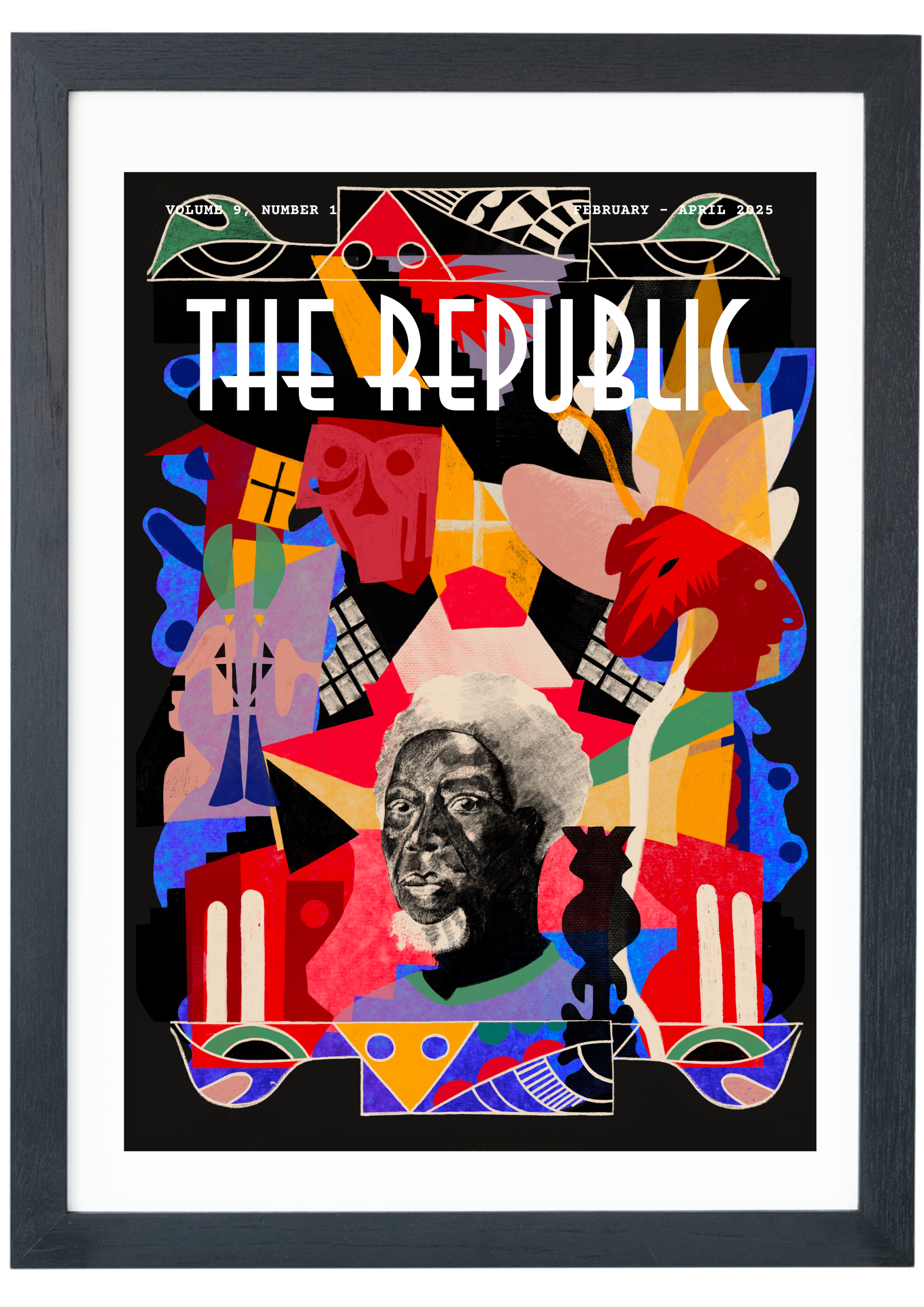 ₦70,000.00 – ₦75,000.00Select options This product has multiple variants. The options may be chosen on the product page
₦70,000.00 – ₦75,000.00Select options This product has multiple variants. The options may be chosen on the product page -
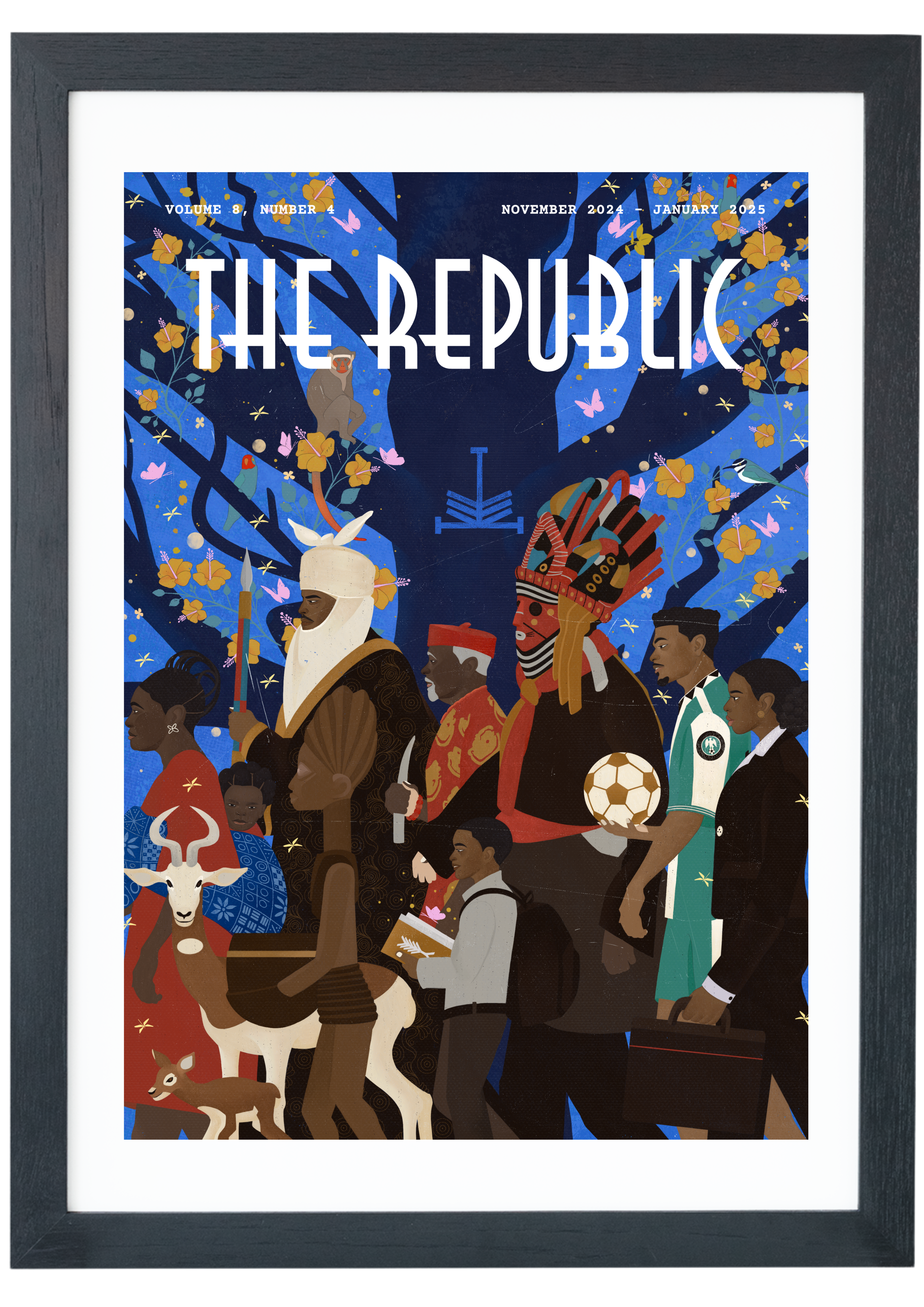 ₦70,000.00 – ₦75,000.00Select options This product has multiple variants. The options may be chosen on the product page
₦70,000.00 – ₦75,000.00Select options This product has multiple variants. The options may be chosen on the product page -
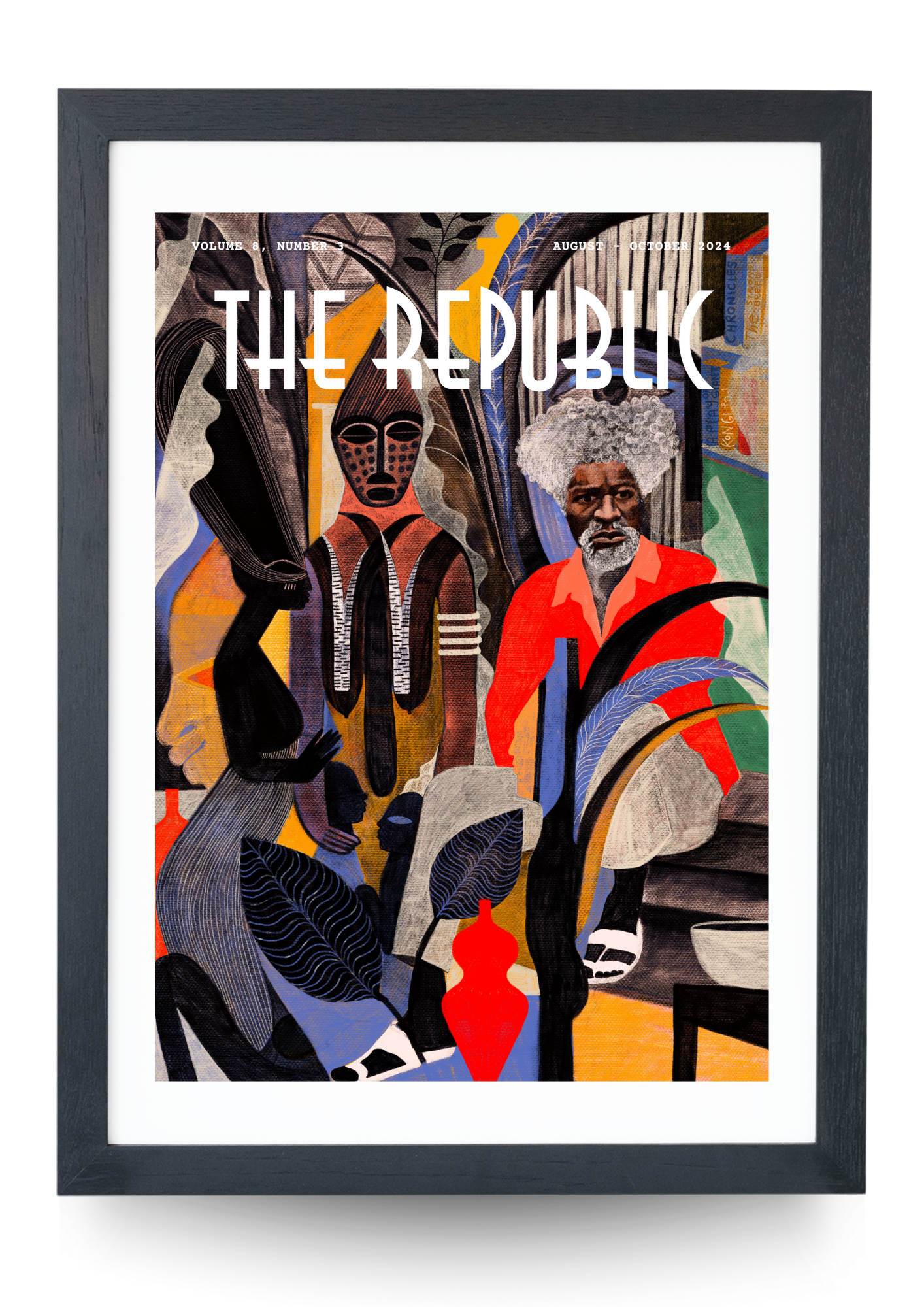 ₦70,000.00 – ₦75,000.00Select options This product has multiple variants. The options may be chosen on the product page
₦70,000.00 – ₦75,000.00Select options This product has multiple variants. The options may be chosen on the product page
shop the republic
-
 ₦70,000.00 – ₦75,000.00Select options This product has multiple variants. The options may be chosen on the product page
₦70,000.00 – ₦75,000.00Select options This product has multiple variants. The options may be chosen on the product page
OSIONE OSENI-ELAMAH
You faced multiple visa rejections in your preparation. How did you navigate these setbacks?
ALMA ASINOBI
Honestly, there was no way to navigate it other than to keep applying. The two visas I struggled with were the Schengen and Australian visas, which were both essential to my journey. Without the Schengen visa, in Europe, I would be limited to just a few countries like the UK and Turkey, which would have been extremely restrictive. I was denied multiple times without any explanation, so it became a trial-and-error process, applying at different embassies until I finally got it.
Australia was even more frustrating. The GWR requirement made stopping in Australia essential. My entire attempt depended on whether I could enter the country, as it was the only one in Oceania that would count. The first application cost me about $600, required blood tests, and was ultimately rejected with a vague reason that could have meant anything. I had to keep tweaking my application and reapplying until I finally secured it after three attempts.
OSIONE OSENI-ELAMAH
During the journey, in what ways, both obvious and unexpected, did your Nigerian passport impact your experience?
ALMA ASINOBI
In what ways didn’t it? Having a Nigerian passport affected every aspect of the trip. The most obvious issue was visas affecting where I could go and how. So, I had to plan my route meticulously. For someone with a stronger passport attempting the same feat, the biggest concern would be flight schedules. They could just up and go.
What was less obvious but equally frustrating was the lack of flexibility. Since my goal was speed, I needed to be hyper-mobile. If a delay or cancellation happened, I couldn’t simply pivot to another country—I might not have the visa for it. That made every disruption much harder to navigate.
OSIONE OSENI-ELAMAH
You mentioned in your announcement video that ‘one delayed flight, one missed flight, one cancelled flight and the record is all over.’ You were well aware of these risks, but how did it feel emotionally when you were on the final leg of your journey, so close to the finish line?
ALMA ASINOBI
It was very hurtful. Although I knew the risks, I always assumed there would be an alternative. Other setbacks during the trip had worked out, so I kept believing this one would too. Standing in Dubai, watching the gate close for my flight to Perth, Australia because there was still no confirmation by Australian authorities on my visa validity—knowing I had come so far—was heartbreaking. I felt defeated.
For a moment, I considered just turning back and heading home. Dubai is an amazing city—I could have stayed, explored, and then left. However, I reminded myself that I had started something, and I needed to finish it, even if I wouldn’t break the record. I had already been rejected for an Australian visa multiple times, and now I was being stopped at the boarding gate. I had already been through so much and couldn’t have gone through it all for nothing. I refused to let that be the end.
shop the republic
OSIONE OSENI-ELAMAH
Looking back, what was the single most defining moment of this journey—one that truly encapsulated the resilience required of a Nigerian traveller?
ALMA ASINOBI
The moment I was denied boarding to Australia. That moment felt like the final blow, but choosing to push forward and find another way to Australia embodied Nigerian resilience.
I don’t think what I did was out of the ordinary for any Nigerian. If another Nigerian had been in my shoes, they would have found a way, too. We don’t give up easily, especially when we know we should have access but are being blocked by arbitrary obstacles. That moment represented everything—the frustration, the determination, and the sheer will to make it happen regardless.
OSIONE OSENI-ELAMAH
You founded Kaijego to address barriers in African travel. How has the response to your GWR attempt influenced your vision for Kaijego and the solutions you’re working on?
ALMA ASINOBI
Kaijego started on the basis of information sharing. Before the group tours, my main focus was helping Africans navigate travel through my blogs. What documents do you need? What visas give access to multiple countries? It was about bridging the knowledge gap.
After this journey, I want to lean into that even more. My goal is to provide as much access to the world as possible for people with low-mobility passports. Africans at home and in the diaspora need information, because access to information is access to opportunity.
OSIONE OSENI-ELAMAH
Beyond policy changes, what role do Nigerian travellers and the local travel industry play in reshaping global perceptions and pushing for greater mobility rights?
ALMA ASINOBI
That’s a very interesting question because, ultimately, policy change is the most crucial factor in improving mobility. The government is the main stakeholder, it must take deliberate steps to make travel easier for Nigerians. A lot of the mobility restrictions we face stem from broader systemic issues, including economic instability. When people have better opportunities at home, they are less likely to overstay visas or find themselves in precarious situations abroad. Take the United Arab Emirates, for instance—you don’t often hear about Emirati citizens leaving and not returning because they have a strong economy to rely on.
While Nigerian travellers and the local industry can help shift perceptions in small ways, meaningful change will always come back to policy. Stronger diplomatic relations, better visa agreements, and economic growth will do far more to expand mobility than anything individuals can do on their own.
shop the republic
-

‘Natural Synthesis’ Print by Diana Ejaita
₦70,000.00 – ₦75,000.00 Select options This product has multiple variants. The options may be chosen on the product page -

‘Homecoming’ Print by Shalom Ojo
₦70,000.00 – ₦75,000.00 Select options This product has multiple variants. The options may be chosen on the product page -

‘Kongi’s Harvest’ Print by Diana Ejaita.
₦70,000.00 – ₦75,000.00 Select options This product has multiple variants. The options may be chosen on the product page -
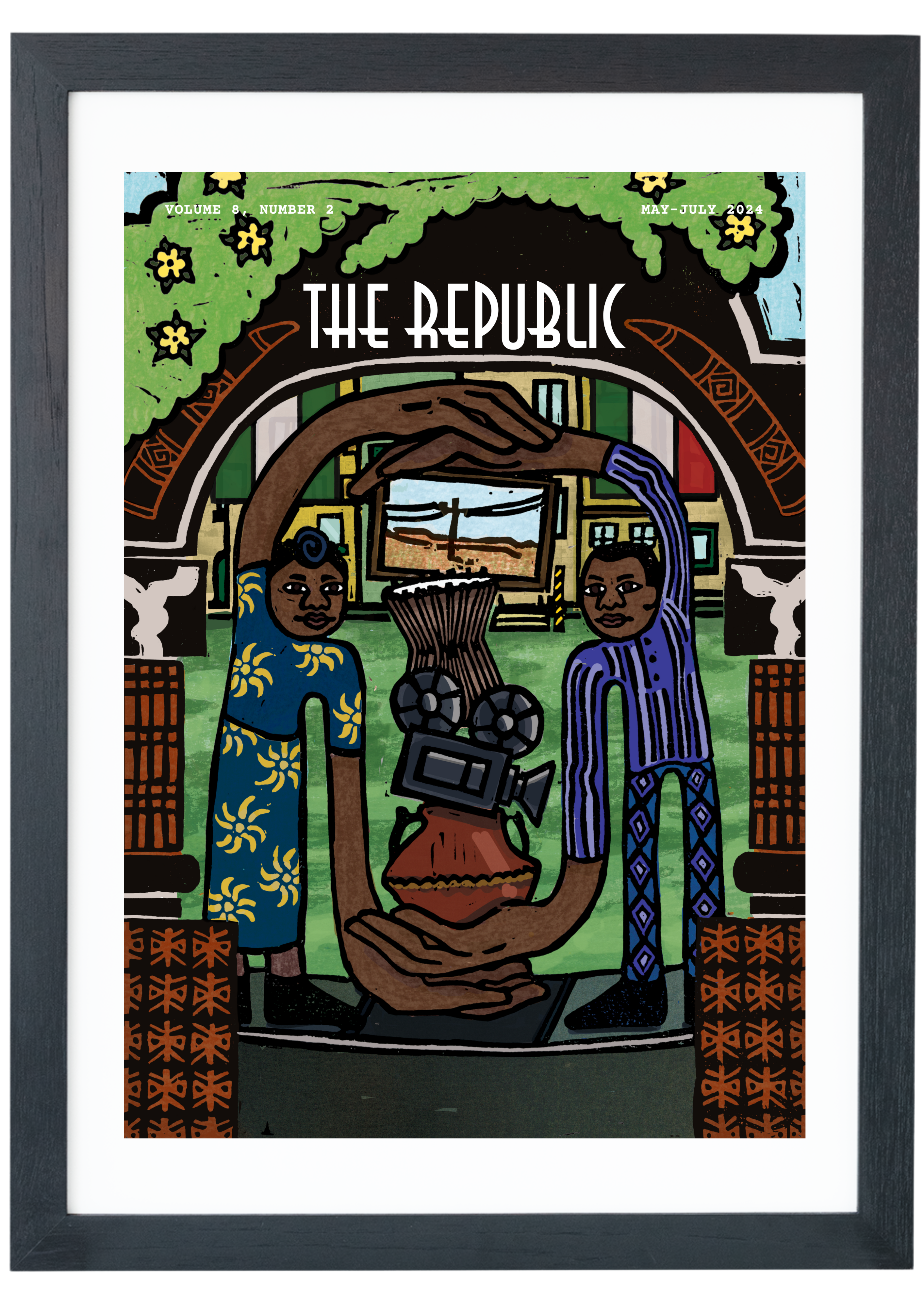
‘Welcome to Venice’ Print by Sarah N. Kanu.
₦140,000.00 – ₦150,000.00 Select options This product has multiple variants. The options may be chosen on the product page
shop the republic
OSIONE OSENI-ELAMAH
Many young Nigerians dream of seeing the world but feel daunted by the obstacles. What advice would you give to someone with a low mobility passport who aspires to travel widely?
ALMA ASINOBI
The first step is research, understanding visa rules and how to maximize access with the right strategy. One of the reasons I don’t see a need to buy another passport to aid travel is because I know a little too much about something I like to call ‘visa hacking’. Visa hacking is just being able to figure out what you need to get into certain places beyond the normal access that your passport will give you. For example, instead of applying directly for a Mexican visa to visit Mexico, apply for a US visa which would require similar documentation and give you access to both countries as well as a dozen others. Similarly, a UK visa grants entry to several additional destinations, and a Schengen visa expands access to around 30 more countries.
The key is to plan ahead, prioritize visas that offer multiple-entry privileges, and look for alternatives that increase mobility. Instead of applying for visas on a case-by-case basis, think about long-term access and optimize your options. That way, you reduce the hassle of constant applications and make the most of every opportunity to travel.
OSIONE OSENI-ELAMAH
You carried the Nigerian flag across all seven continents. What did that moment symbolize for you, and what message do you hope it sends to Nigerians at home and in the diaspora?
ALMA ASINOBI
I tend to be a very stubborn person. When I want to do something, I do it. No matter the obstacles. I will always find a way. Carrying the Nigerian flag across all continents was a statement. We don’t have a Nigerian flag on the moon or on Mars and Nigerians generally don’t have access to a lot of global opportunities. The world makes it incredibly difficult for us to travel, yet here I was, proving that we can.
The fastest flag to travel across all seven continents is a Nigerian flag. That’s powerful. If you asked someone which country’s flag achieved this, they would likely guess a hundred others before thinking of Nigeria. That’s the effect I wanted to have. To show that we are capable, that by one woman’s grit or resilience, by one person’s decision to change things and make a bold statement, we can open doors⎈
BUY THE MAGAZINE AND/OR THE COVER
-

‘Natural Synthesis’ Print by Diana Ejaita
₦70,000.00 – ₦75,000.00 Select options This product has multiple variants. The options may be chosen on the product page -

The Republic V9, N1 Demas Nwoko's Natural Synthesis And The Rise of African Architecture
₦15,000.00 Buy Now




